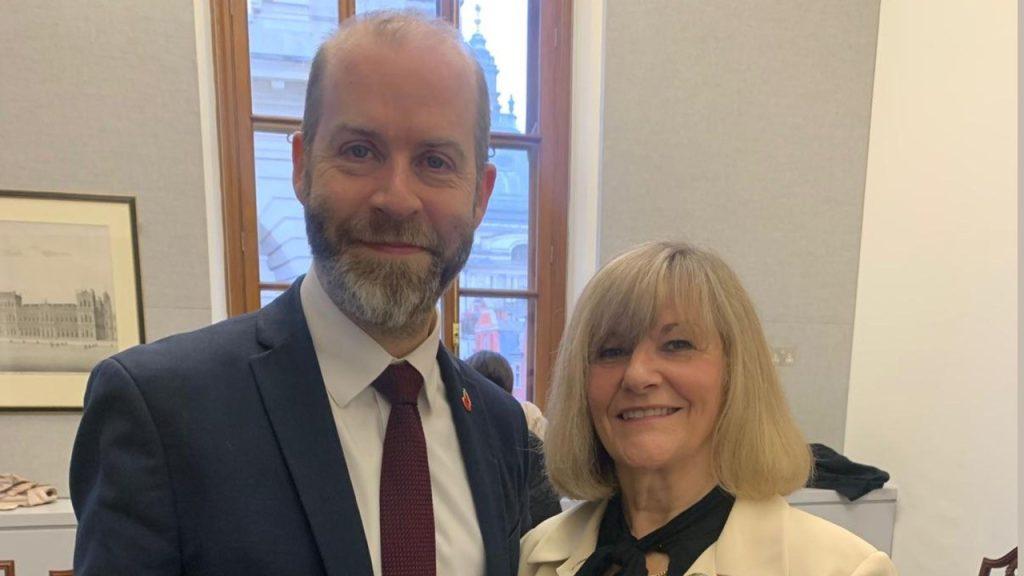
“Hearing other entrepreneurs share their perspectives reinforced that we’re not alone with the issues we face. Collectively, we share a determination to innovate and grow, despite the hurdles.
On 6th November, Julie Evason – our Founder and Managing Director – had the pleasure of attending a Small Business Breakfast Roundtable hosted by the Secretary of State for Business and Trade, Jonathon Reynolds MP. Along with leaders from seven other SMEs, Julie had been invited to participate in an open discussion about the challenges and opportunities facing small to medium-sized business enterprises today.
This event came at a pivotal moment following Wes Streeting’s announcement of a new, three-pronged focus: prevention, the move to digital health, and moving health from hospital to community – all three of these being areas where we have pushed forward innovation – over 20 years.
Julie reflects below on the session, and shares valuable takeaways, highlighting key areas where government policy could better support SMEs like Health Diagnostics.
A SURPRISING and VALUABLE OPPORTUNITY
“Being invited to this roundtable was a surprise and a fantastic opportunity. As a small health tech business from Chester working in preventative health programmes, it was the perfect platform to discuss how we’re tackling challenges in the industry, and what we need to keep doing good work.”

Julie added that she valued hearing from other SMEs facing similar challenges: “It was great to share the pain points many of us experience as small businesses,” she said, adding, “Hearing other entrepreneurs share their perspectives reinforced that we’re not alone with the issues we face. Collectively, we share a determination to innovate and grow, despite the hurdles.”
SHARED CHALLENGES across SMEs
The roundtable revealed that SMEs in different industries often face overlapping obstacles. Three major themes emerged during the discussion: funding, skills gaps, and compliance burdens.
FUNDING CHALLENGES
“The key thing that came up repeatedly was funding,” Julie reflects. “For many SMEs, obtaining funding requires significant personal guarantees, which can feel at times like you’ve had to put your house on the line. But even when you secure funding, it often comes with a trade-off – giving up a portion of your business, for instance.”
Potential solutions the group discussed included:
- The British Business Bank taking a stronger role in investing in SMEs, particularly outside London, to ensure more regional support.
- Pension funds could be leveraged so as to back small businesses, thus fostering sustainable growth, and supporting innovation.
ADDRESSING the SKILLS GAP
A lengthy topic of discussion was how to bring more people back into work to address the current skills gap. “There are so many people who are not in work,” Julie explained, “and big businesses are often the default for talent, but what about SMEs? How can we collectively do better at directing talent to our size of business, too?”
She suggested that some tailored initiatives could help, such as:
- Partnering with SMEs to nurture talent instead of relying on larger corporations.
- Supporting digital self-service tools for SMEs to streamline their recruitment and workforce management activities.
- Expanding growth hubs to include workforce support and training.
COMPLIANCE: an OVERWHELMING BURDEN
For health tech businesses like Health Diagnostics, the cost and complexity of compliance is an ongoing challenge. Julie notes:
“From Cyber Essentials Plus, clinical safety certifications, data protection and data security, the level of compliance required can seem overwhelming. Whilst we see and acknowledge the importance of maintaining exceptional standards, for many budding entrepreneurs, the health tech sector can present very high barriers to entry”
The need for regional training hubs to support SMEs was suggested. As Julie explains, “Smaller businesses don’t have the resources of large companies, but a regional hub could be a one-stop-shop for accessing information (e.g. simplified guidance on regulatory processes) for training, and for shared learnings tailored to businesses at different stages of growth.”
EMBRACING AI and DIGITAL TRANSFORMATION
The increasing role and dependency of AI and technology in business and healthcare wove through many of the morning’s conversations. Julie acknowledged both the excitement and apprehension surrounding AI. “AI is often seen as ‘smoke and mirrors’, so while there’s incredible potential, there’s also nervousness about how data is handled and secured. We need to maximise AI’s potential while ensuring data security and building trust.”
Key recommendations included:
- Expanding secure, state-of-the-art data centres in the UK to handle growing data demands securely and sustainably.
- Creating a National AI Adoption Programme to ensure SMEs can benefit from AI while addressing concerns about trust, security, and accessibility.
For Health Diagnostics, digital tools and platforms are at the heart of our work in preventative healthcare. Julie emphasised to the round table the importance of integrating patient data seamlessly:
“A single patient record that follows the individual wherever they go – whether in primary, secondary, or private care – would be transformative. Patients owning their records could make health management proactive and meaningful. The more you know about yourself, the more meaningfully you can set about making positive lifestyle changes.”
PREVENTATIVE HEALTHCARE and NHS PRIORITIES
Whilst this was a meeting around the industrial strategy, Julie wanted to use the opportunity to mention the welcome alignment between Health Diagnostics’ mission and the new 3-pronged NHS priorities named above: prevention, community, and digital transformation. In her words, “Hearing Wes Streeting highlight prevention as a key priority was very encouraging. For 40 years, I’ve been advocating for proactive lifestyle changes to prevent cardiovascular disease and diabetes,” Julie shared, adding, “It’s exciting to see prevention finally being recognised as a national priority.”
With around 64% of the population overweight or obese and approx 15% of children aged between two and 15 reported as obese (reported by NHS England 24 Sept 2024) this is a ticking time bomb which needs urgent action.
At the same time, she acknowledged the immense challenges facing the NHS. With 10% of the population (7.7 million) – currently on the waiting list for hospital treatment, the strain on the system is clear. The £13.8 billion maintenance backlog further underscores the urgent need for investment to modernise infrastructure and improve care delivery
Julie also stressed the need to make preventative healthcare more accessible: “Programs such as NHS Health Checks are invaluable, but access for patients shouldn’t depend upon local stakeholders’ willingness to participate in delivering high-quality services. Prevention should prioritise patient choice rather than access to such services being dependent on a postcode lottery.”
REFLECTIONS and TAKEAWAYS
Julie left the roundtable with a sense of shared purpose saying, “Speaking with other SMEs, it was clear we all face similar challenges. Whether it’s funding, compliance, or embracing new technologies, we need tailored support to work through these hurdles.”
Looking ahead, Julie identified the following critical areas for the government to action, to support small businesses:
- Improved access to funding
- Streamlined compliance support
- Improved procurement opportunities
- Regional training hubs
- Investing in data transformation and AI
FINAL THOUGHTS
Julie’s reflections highlight the resilience and innovation of SMEs like Health Diagnostics, while underscoring the need for targeted support. As she noted: “Our mission is about empowering people to take charge of their health, and that starts with prevention. With the right policies and infrastructure in place, SMEs in the health space can drive innovation, improve public health outcomes, keep people in work and boost the UK economy.”
The roundtable was an important step in amplifying the voices of SMEs. Health Diagnostics is proud to contribute to this dialogue, and looks forward to seeing how these conversations translate into meaningful action.
